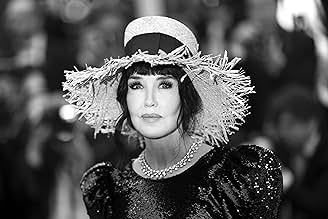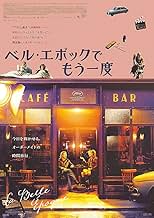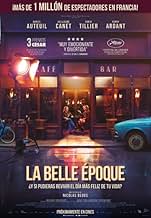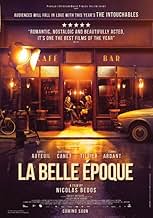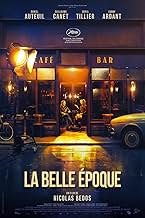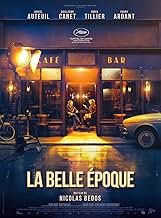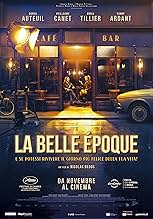AVALIAÇÃO DA IMDb
7,4/10
21 mil
SUA AVALIAÇÃO
Um casal em crise. Ele, desiludido, vê a sua vida perturbada no dia em que um empresário lhe oferece para mergulhar de novo no tempo da sua escolha.Um casal em crise. Ele, desiludido, vê a sua vida perturbada no dia em que um empresário lhe oferece para mergulhar de novo no tempo da sua escolha.Um casal em crise. Ele, desiludido, vê a sua vida perturbada no dia em que um empresário lhe oferece para mergulhar de novo no tempo da sua escolha.
- Prêmios
- 6 vitórias e 22 indicações no total
Bruno Raffaelli
- Maurice
- (as Bruno Raffaelli de la Comédie Française)
- …
Avaliações em destaque
Just saw this film at the VIFF. The opening scene is worth the price of admission and the fast-paced dialogue had me engaged throughout the film. Lots of witty lines and funny gags had the audience laughing. The acting was superb, especially Margot, who had to play her real life role as the director's girl friend and her acting role as Victor's wife in the past. Victor also was excellent playing the down and out jilted husband seeking connection to his past. Overall the tight script and flawless acting makes it one of my favourite movies of the year.
I'd thought of writing a long, involved review of this one, concentrating on the plot antecedents, but what's the use? It's so much fun watching this comedy with dramatic touches that my critical sense is forgotten. Daniel Auteuil is splendid as Victor, and he makes the comic transitions from scene to scene very well. Fanny Ardant changes from sourly critical to warmly emotional as needed--haven't seen her as good at comedy since 8 Women. That's all; I hope to see it again on video.
Aging Victor is down on his luck: he's unemployed and he has been kicked out of his own home as his wife has left him for his former boss, the man who fired him. Then he is offered a chance to recreate a moment in time and he chooses the moment in 1974 when he and his wife first met.
An interesting, entertaining and emotional film. Great in its application of nostalgia and our desires to relive our fondest moments. The central plot is quite basic and ends fairly predictably, though emotionally. However, some of the sub-plots are quite interesting, especially the Antoine-Margot-Victor relationship. There's also some very funny moments: the assistant director gets some great scenes and one-liners.
Not always engaging though. The plot does seem unfocused at times and some scenes and sub-plots go nowhere.
Can't fault the casting: the big names, Daniel Auteuil and Fanny Ardant, are great and nobody puts a foot wrong. Doria Tillier, as Margot, steals the show though.
An interesting, entertaining and emotional film. Great in its application of nostalgia and our desires to relive our fondest moments. The central plot is quite basic and ends fairly predictably, though emotionally. However, some of the sub-plots are quite interesting, especially the Antoine-Margot-Victor relationship. There's also some very funny moments: the assistant director gets some great scenes and one-liners.
Not always engaging though. The plot does seem unfocused at times and some scenes and sub-plots go nowhere.
Can't fault the casting: the big names, Daniel Auteuil and Fanny Ardant, are great and nobody puts a foot wrong. Doria Tillier, as Margot, steals the show though.
Nicolas Bedos' La Belle Époque has distinctive French flavor and is somewhat old-fashioned.
The film is really light-hearted and is all about love.
And yet it is fascinating and can easily bring you to tears.
Many viewers may recognize Nicolas Bedos in the movies like Love Is in the Air (Amour et turbulences) or Love Lasts Three Years (L'Amour dure trois ans). Still, he is first and foremost a writer and a director, and he is as good at those crafts as in the romantic films being an actor.
His new film combines drama and comedy, restraint and passion, romance and real life.
The main characters of the film are Victor, an illustrator, and Marianne, a psychologist. Both of them are not young, but have completely different outlooks. Victor is stuck somewhere in the distant past, whereas his wife Marianne still wants to take more from life.
The film constantly maintains a fast emotional pace. The tension becomes palpable. The relationships of the couple are on the verge of collapse. They are drifting apart being constantly annoyed. It seems that they just do not want to be close any more, but they might as well not realize how much they really want to be together. Nobody wants to concede and they have to decide whether they are moving on together or separately.
Perhaps, when everything goes wrong it is worth recalling how it used to be. What were you like, what were you both like? In such a way you might revive some stimulating ideas, your love or just find yourself. The only thing you need is a small push.
Victor has got a chance to check it out. His son gave him a present - an incredible journey into the past. He can choose any era and the team of professionals will transfer him to the chosen place and time.
The puppeteer of the business which aims at bringing hope is Antoine (Guillaume Canet). He is a sheer perfectionist who creates authentic historical installations where you can meet Napoleon, Maupassant, or even your own deceased father.
Such an expert would surely have been welcomed in the Ridley Scott's crew when filming Gladiator or Quentin Tarantino's crew when making Inglourious Basterds. However, taken into account Antoine's temper, they would probably have not got along. Just like Antoine's team can hardly stand his annoying behavior.
Antoine is ready to fulfill any of Victor's whim. The latter has chosen to travel back in time into his own past, namely the day he met the love of his life. It was the time when he was breathing freely; he was drawing and was the person he wanted to be.
Someone might find such choice a bit weird. Nevertheless, the main hero has made a decision to live his life again, to make up for the lost time. And the big game starts.
At first, Victor is amused by small inaccuracies of what is going on around him. However, in some time he becomes engrossed into this fictitious world. A completely innocent, at first glance, the game grows into something much bigger.
Victor changes. A fire lights up in his eyes again. He starts a struggle with himself without being fully conscious of that.
Leading this fight you need to stop in time and understand that whiskey is not as tasty as it could be because instead of it you are drinking water. Love is present not only in that one specific day, but it is also inside us.
In La Belle Époque, the characters quarrel and reconcile, love and hate, admire and despise. Despite that, love is prevalent in the given chain of emotions. It is the key even if you need to create the whole new world to save or find it.
The film is really light-hearted and is all about love.
And yet it is fascinating and can easily bring you to tears.
Many viewers may recognize Nicolas Bedos in the movies like Love Is in the Air (Amour et turbulences) or Love Lasts Three Years (L'Amour dure trois ans). Still, he is first and foremost a writer and a director, and he is as good at those crafts as in the romantic films being an actor.
His new film combines drama and comedy, restraint and passion, romance and real life.
The main characters of the film are Victor, an illustrator, and Marianne, a psychologist. Both of them are not young, but have completely different outlooks. Victor is stuck somewhere in the distant past, whereas his wife Marianne still wants to take more from life.
The film constantly maintains a fast emotional pace. The tension becomes palpable. The relationships of the couple are on the verge of collapse. They are drifting apart being constantly annoyed. It seems that they just do not want to be close any more, but they might as well not realize how much they really want to be together. Nobody wants to concede and they have to decide whether they are moving on together or separately.
Perhaps, when everything goes wrong it is worth recalling how it used to be. What were you like, what were you both like? In such a way you might revive some stimulating ideas, your love or just find yourself. The only thing you need is a small push.
Victor has got a chance to check it out. His son gave him a present - an incredible journey into the past. He can choose any era and the team of professionals will transfer him to the chosen place and time.
The puppeteer of the business which aims at bringing hope is Antoine (Guillaume Canet). He is a sheer perfectionist who creates authentic historical installations where you can meet Napoleon, Maupassant, or even your own deceased father.
Such an expert would surely have been welcomed in the Ridley Scott's crew when filming Gladiator or Quentin Tarantino's crew when making Inglourious Basterds. However, taken into account Antoine's temper, they would probably have not got along. Just like Antoine's team can hardly stand his annoying behavior.
Antoine is ready to fulfill any of Victor's whim. The latter has chosen to travel back in time into his own past, namely the day he met the love of his life. It was the time when he was breathing freely; he was drawing and was the person he wanted to be.
Someone might find such choice a bit weird. Nevertheless, the main hero has made a decision to live his life again, to make up for the lost time. And the big game starts.
At first, Victor is amused by small inaccuracies of what is going on around him. However, in some time he becomes engrossed into this fictitious world. A completely innocent, at first glance, the game grows into something much bigger.
Victor changes. A fire lights up in his eyes again. He starts a struggle with himself without being fully conscious of that.
Leading this fight you need to stop in time and understand that whiskey is not as tasty as it could be because instead of it you are drinking water. Love is present not only in that one specific day, but it is also inside us.
In La Belle Époque, the characters quarrel and reconcile, love and hate, admire and despise. Despite that, love is prevalent in the given chain of emotions. It is the key even if you need to create the whole new world to save or find it.
I adored this romantic and retrò movie! I think that many people can recognize themselves in the situation of the protagonists, especially couples who have been married for a long time. Through the past that comes back and becomes true, they find a new light in their life and love.
The idea to create a set in which anyone could experience the era that he most likes is brilliant and I would be the first client if this would be really possible. The idea is smart and original.
Many intense moments bring with them some tears, but also laughs and passion. It is definitely a movie to watch!
Você sabia?
- CuriosidadesThe caged parrot is named "Mesrine", a reference to Jacques Mesrine, a famous French criminal of the 1960s and 70s who repeatedly escaped from prison.
- Erros de gravaçãoAt the hippie party you can hear the song 'Yes Sir I can boogie', which was released in 1977 , not 1974.
- ConexõesReferenced in Vecherniy Urgant: Fanny Ardant/Alexander Ivanov (2019)
Principais escolhas
Faça login para avaliar e ver a lista de recomendações personalizadas
- How long is La belle époque?Fornecido pela Alexa
Detalhes
- Data de lançamento
- Países de origem
- Central de atendimento oficial
- Idiomas
- Também conhecido como
- La belle époque
- Locações de filme
- Empresas de produção
- Consulte mais créditos da empresa na IMDbPro
Bilheteria
- Faturamento bruto mundial
- US$ 14.384.206
- Tempo de duração
- 1 h 55 min(115 min)
- Cor
- Proporção
- 2.35 : 1
Contribua para esta página
Sugerir uma alteração ou adicionar conteúdo ausente

![Assistir a Trailer [English SUB]](https://m.media-amazon.com/images/M/MV5BNzc4YzEzNTYtMzVkOC00NDlmLWI0ODItNTliODNlOWRmOGIxXkEyXkFqcGdeQXRyYW5zY29kZS13b3JrZmxvdw@@._V1_QL75_UY281_CR87)
![Bande-annonce Teaser [OV]](https://m.media-amazon.com/images/M/MV5BNjBlOTQyODUtMTRlNi00MjgyLWIxNjYtYjRhMjRhZjMwOTdmXkEyXkFqcGdeQXRyYW5zY29kZS13b3JrZmxvdw@@._V1_QL75_UX500_CR0)

